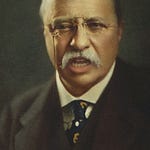Hello, I am Justice Louis D. Brandeis, and I once said, “We can either have democracy in this country or we can have great wealth concentrated in the hands of a few, but we cannot have both.” Today, I want to discuss the significance of this statement—how it applied in my time and why it remains profoundly relevant today. When I spoke these words, it was the early 20th century, an era marked by the rapid expansion of industrial capitalism. Wealth was becoming increasingly concentrated in the hands of a small group of powerful industrialists and financiers. The rise of monopolies and trusts created economic inequalities so vast that they threatened to erode the foundations of democracy. Workers faced grueling conditions, their voices drowned out by the sheer power of moneyed interests. At the same time, corruption infiltrated political systems, with wealthy individuals using their influence to shape laws and policies that served their interests rather than the public good. I believed then, as I do now, that democracy and concentrated wealth are inherently incompatible. Democracy depends on equality—equality of opportunity, equality under the law, and equality in political participation. When wealth becomes overly concentrated, it allows a select few to dominate public discourse, influence elections, and control the levers of power. This creates a system where the majority’s interests are subordinated to those of the wealthy elite, undermining the very essence of democratic governance.
Playback speed
×
Share post
Share post at current time
Share from 0:00
0:00
/
0:00
Transcript
We can either have democracy in this country or we can have great wealth concentrated in the hands of a few, but we cannot have both.
Justice Louis D. Brandeis
Dec 24, 2024
Timeless Quotes: A Journey Through Enduring Wisdom (private feed for hase@peachwiz.com)
Timeless Quotes: A Journey Through Enduring Wisdom (private feed for hase@peachwiz.com)
Timeless Quotes: A Journey Through Enduring Wisdom (private feed for hase@peachwiz.com)Listen on
Substack App
Spotify
RSS Feed
Recent Episodes










